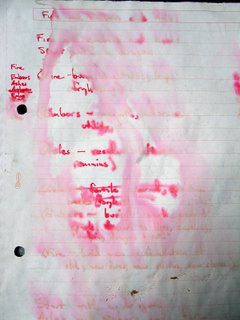So you get to the parking lot at work, racing the time clock, and get out of the car, juggling a large insulated mug and the multi-pocketed bag where you keep a snack, some extra drinks, reading material, miscellaneous papers and a notebook. And in the midst of the juggling, some of the mug's contents spill out its top vent.
But only a splash against the side of the bag, which you quickly wipe off, then hurry in to start work.
A few hours later,the mail's been sorted and trayed, everything loaded into your truck, you've done the first section of your delivery route, and you stop for your first rest break.
Which is when you find that the splash you saw hit the outside of the bag was
only the one you saw, and that the splash of liquid you
didn't see was the one that fell directly into the open pocket where you keep
your writing notebook.
The notebook you write in almost exclusively with gel pens. Pens whose smooth-flowing ink is
water-soluble.
The notebook where that splash of liquid has had several hours to percolate and spread, meanng that the pages in that notebook now look something like
this:

The good news is that the pages written with black or blue gel pens didn't bleed as badly; they're mostly still legible. But the ones written with red gel... wow.
This is one time I'm glad I'm not in a writing workshop right now. Sure as shooting, some smartass would say "
Some of your descriptions are a little unclear."




